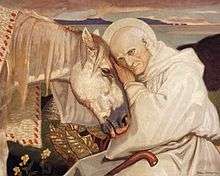Gaelic literature
Gaelic literature (Irish: Litríocht na Gaeilge; Scottish Gaelic: Litreachas na Gàidhlig) is literature in the vernacular Gaelic languages of Ireland, Scotland and the Isle of Man.
| History of literature by era |
|---|
| Bronze Age |
| Classical |
| Early Medieval |
| Medieval |
| Early Modern |
|
| Modern by century |
|
|
Gaelic literature is recognised as one of the oldest literature traditions of Europe, excepting only Latin literature and Greek literature: literature has been written in Gaelic languages from the 1st centuries AD to the present day. Latin had been used extensively in the Gaelic lands, with the advent of Christianity, however, the Gaels were in the vanguard as regards using their own language to write literary works of merit.
History
Old Gaelic, 300s CE—900s CE

Before the arrival of Christianity in Ireland, the Gaels had a limited level of literacy in Primitive Irish. This manifested itself in ogham inscriptions in wood and stone; typically memorials to the dead or boundary markers.[1] The traditional stories of the people were circulated in the form of oral culture, rather than written down. Works of a Christian nature were the first to appear in the Sean-Ghaeilge (Old Irish), the earliest form written in Latin script, as it would appear that the Gaelic speaking monks wanted to impart the religion to their flocks in the native tongue. It is thought likely that the first church hymns and prayers were composed in Old Irish as early as the 6th century. The work Amra Choluim Chille is the earliest extant literary work of this nature left to us. It is written in a very early form of the Sean-Ghaeilge, and the Meter has an old-fashioned appearance, more so than the rest of the literature of this period. Experts think that it was composed by Dallán Forgaill, towards the end of the 6th century, when Colm Cille had died.
Middle Gaelic, 900s CE—1200s CE
Classical Gaelic, 1200s CE—1780s CE
Gaeilge and Gàidhlig, 1780s CE—present
Main articles
- Early Irish literature
- Gaelic script – the writing system used for Middle Irish and Modern Irish
References
- "Literacy and Learning in Ireland before and after Patrick". Irish Philosophy. 29 January 2015.
External links
- Gaelic Literature, Language & Music
- Comparative Reading of Manx Cultural Revivals
- Gaelic Literature
- Modern Gaelic Literature
- The Gaelic Literature of Argyll
- Gaelic Literature
- Clare's Gaelic Bardic Tradition
- GAELIC LITERATURE IN THE NINETEENTH CENTURY
- New Publications in Irish Gaelic2006-07
- Gaelic Rare Books
- Scottish Gaelic Books
- Comhairle nan Leabhraichean